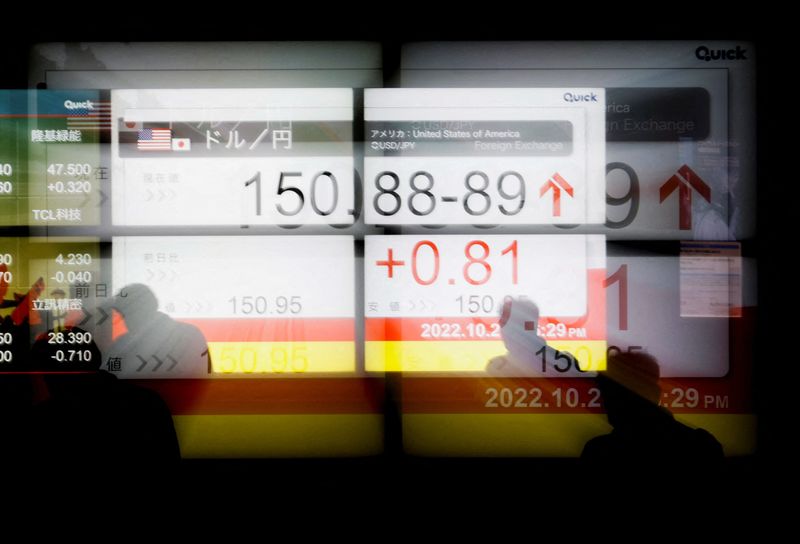(This Oct.22 story has been corrected to show dollar, not yen, fall in paragraph 3)
By Shinji Kitamura and Yoshifumi Takemoto
TOKYO (Reuters) - Japan intervened in the foreign exchange market on Friday to buy yen for the second time in a month after the currency hit a 32-year low near 152 to the dollar, a government official and another person familiar with the matter told Reuters.
Japan has been attempting to shore up the battered currency as the central bank sticks with ultra-low interest rates, countering a global trend of tightening monetary policy and widening the gap between U.S. and Japanese interest rates.
After the dollar rose to 151.94 yen, its highest since 1990, the intervention drove the greenback down more than 7 yen to a low of 144.50 yen. The U.S. currency was last down 1.8% at 147.34 yen.
The Ministry of Finance (MOF) intervened in several stages from around 9:35 p.m. (1235 GMT), one source said.
"We are maintaining our stance of being ready to take appropriate action against excessive forex volatility," Prime Minister Fumio Kishida told reporters on Saturday after meeting with Australia's Anthony Albanese, reiterating that such volatility could not be tolerated.
Kishida declined to comment further, saying, "I will not make any detailed comments on forex" when asked about Friday's intervention.
Japan's top currency diplomat, Masato Kanda, also declined to say whether the MOF had intervened.
"We won't comment now on whether or not we conducted an intervention," Kanda, the vice finance minister for international affairs, told Reuters on Saturday, saying that this was a stance the MOF has stuck to over the past several weeks.
He added that the ministry would not confirm whether an intervention had taken place for some time yet, signalling possible "stealth intervention" to engage in a war of nerves against investors selling the yen.
The MOF also bought yen on Sept. 22, as investors focussed on the widening divergence between the BOJ's ultra-loose monetary policy and the U.S. Federal Reserve's aggressive rate hikes.
Finance Minister Shunichi Suzuki and Kanda have repeatedly signalled the government's readiness to intervene, warning against excessive volatility. Suzuki said before the intervention on Friday the authorities were ready to act "strictly" against speculators.
Many market players doubt whether Tokyo can reverse the yen's downtrend with solo intervention, even with Japan's $1.33 trillion in foreign reserves.
The Group of Seven industrial powers agreed this month to closely monitor recent volatility but stopped short of indicating they were prepared for joint intervention.

Japan bought a record 3.6 trillion yen ($24 billion) in the September action, Tokyo money market brokerage firms estimated.
($1 = 147.6400 yen)